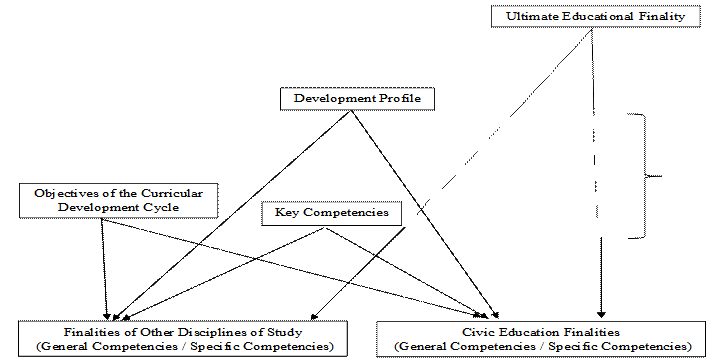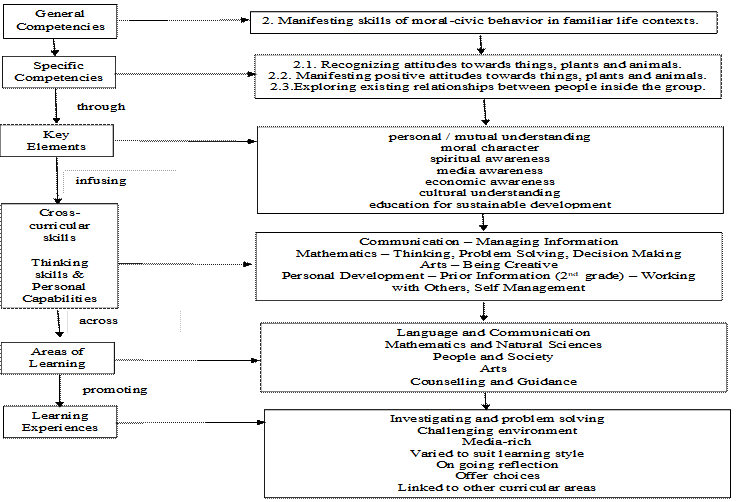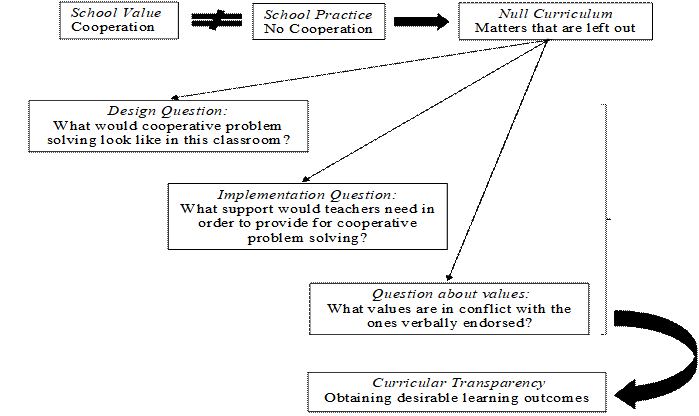Abstract
The dynamics of today's society exposes children to controversial issues through media and modern technology, requiring schools to adopt an adaptative attitude by consciously dealing with uncomfortable subjects. Although there is a tendency for diametrically opposed points of view or erroneous interpretations of facts to trigger controversy, an open educational approach that bluntly addresses difficult subjects can counteract these undesirable phenomena. This paper crosses several problematic territories of a theoretical nature, so a first step is the conceptual transparency of "controversial subjects". Then, based on the previous interpretation, the main analytical challenge will be to identify the curricular status of the controversial topics. For that purpose, we will try to identify evidence of the "dance" that curricular documents apply to this type of content: is it proposed? is it insinuated? is it avoided? This will try to establish the specific status: curriculum to be taught / hidden curriculum / null curriculum. The reflexive exercise will consist of an analysis of the potential (even the latent one) that the current written curriculum of a subject studied in primary school (Civic Education) holds in relation to the controversial topics. Thirdly, potential scenarios of meditative negotiation that the teacher can practice will be outlined, some associated pedagogical principles and, implicitly, some practical routes will be updated. Naturally, the teacher who implements such a difficult approach of addressing controversial topics gives students opportunities to explore, develop and assertively express their own values and opinions, and also prepares them for life situations.
Keywords: Controversial issuesnull curriculumCivic Education
Introduction
Research on controversial issues began in the 1960’s. McAulay (1965), interviewed 648 teachers of social studies and showed that 52% felt they would be rebucked for discussing controversial issues in the classroom, position that made them feel uneasy. Negative perceptions about the security of their job and status decreased the practice of teaching controversial issues (as cited in Philpott, Clabough, McConkey, & Turner, 2011, p. 32-44).
Byford, Lennon and Russell (2009), surveyed the responses of 67 social studies teachers. The results indicated that even though tutors believed in developing “informed and enlightened” citizens they were less wishful to teach sensitive subjects due to student disruptions and conflict (as cited in Philpott et al., 2011, p. 32-44)
Teachers tend to avoid these sensitive subjects because they are concerned about their students’ negative or unpredictable reactions and also due to insufficient knowledge or skills to work with difficult topics (Fournier-Sylvester, 2013).
Problem Statement
Handling controversy seems to generate feelings of awkwardness for the educators. Therefore, why teach them? Dealing with sensitive issues in a safe structured environment, managing uncomfortable topics in the classroom, represents an empowerment for dealing with more immediate controversy in the playground, home or community. Moreover, it prepares students for living in a democratic society where controversial subjects are debated and discussed without the use of violence (Claire & Holden, 2007, p. 43, as cited in Hunt, 2016).
Young people need to clarify their emotions and values and learn to think for themselves. In fact, the teacher’s primary role is to make students responsible for their personal rise, enabling them to sit with both feet on the floor of the school, aware that they need to build “something” with their own resources (Petre, 2014a). The use of challenging matters in the classroom develops information-processing skills, reasoning skills, enquiry competencies, creative thinking abilities and evaluation skills. Students are enabled to classify, compare and contrast information, justify opinions and actions, ask relevant questions, generate possible hypotheses, look for alternative outcomes and judge correctly the value of their own and others’ work and ideas. Discussing current events and controversial issues in the classroom leads to major refinement in the areas of critical thinking, tolerance, civic knowledge, political interest, confidence, social integration and intentions to vote (Oxfam, 2006);
Research Questions
This study explores the following questions: What are controversial topics? Are controversial topics part of the null curriculum or are they learning experiences? How are controversial topics being handled in the Romanian Syllabus of Civic Education? What practical itineraries can be followed when dealing with controversial topics?
Purpose of the Study
The purpose of this study was to discover whether controversial topics are handled as learning experiences or as a part of the null curriculum inside the classroom ethos. Furthermore, because of the level of difficulty when dealing with controversy in schools, this papers supplies some practical itineraries educators can follow when they need to handle sensitive issues. In an attempt to encourage teachers to explore their professional skills and students to develop critical thinking competencies, the study emphasizes the benefits of working with controversy in an ever changing society;
Research Methods
An analyse of the pedagogical literature on this specific topic revealed the status of controversial issues and the current curricular approaches. We studied the Romanian Syllabus of Civic Education to find traces of sensitive matters and we proposed a panoramic view in order to offer clarity on how to effectively include controversial topics in the 3rd grade Civic Education Classes.
Findings
In general terms, controversial issues are topics that have effects both at personal level, causing emotional distress, challenging personal beliefs and values and, at transpersonal level, deeply dividing society. Social welfare payments, immigration, political positions, historical events, crime, imprisonment, equity in education, disability are widely considered controversial topics (CDVEC Curriculum Development Unit, 2012). Dearden (1981) insures one of the oldest philosophic definition of controversy, claiming that controversial subjects are not at all the matters that are sensitive, generating strong feelings, and causing arguments between people. He remarks that “a matter is controversial if contrary views can be held on it without those views being contrary to reason” (p. 38). Stradling (1984), asserts that controversial topics are those that divide society in a profound manner, offer antithetical explanations and solutions based on different value systems (as cited in Harwood & Hahn, 1990). To put it in another way, controversy appears when both people have "right" views. Harwood and Hahn (1990) see controversy as a dialogue between people having different opinions, situation which creates disagreement and arguments among the members of a discussion. Furthermore, Rooy (1993) generated a scientific perspective, defining controversial issues as data based on empirical or experimental evidence, open to a various interpretations and points of view. Rooy seems to outline the various possibilities of data interpretations. In fact, a “sensitive controversy” is an epithet. It is not the controversy that is sensitive, but the person responding to it in an emotional, distressed manner (Forrest, 2008, p. 80-93). Controversy tends to increase when topics are being personalized by students. Someone who has himself / herself been stigmatized for immigration or racial reasons, for example, may find difficult to express in terms of the standard talking points and may experience the class discussion as passing judgement on them (Hendricks, 2011). Naturally, it is impossible to predict or fully control when a controversial matter might arise in classroom discussion, yet the teacher can design lessons in order to raise issues strategically. Basically, the educator should attempt to develop students’ logical and analytical skills in discussions of simple sensitive topics before undertaking to fully developed controversies (Forrest, 2008).
As it starts from a natural necessity, learning must be intuitive, psychological, active, educational, practical, durable, solid and individualized (on students’ needs). The matter that is taught must arouse students’ interest or be presented in an interesting manner, depending on the teacher’s abilities (Petre, 2014b). Educators are aware of the fact that there is a direct link between students’ interest and subjects which are considered taboo. Debate or opposing approaches are often avoided in the classroom, having too little time and content coverage in the curricular documents. There is a tendency to ignore or hurry controversial issues leaving them without an analysis of the dynamics and complexities of the discourse.
As shown before, there is no standard definition of controversy. Therefore, a sense of variance in regard to the educators attempt to handle controversial matters is completely understandable. According to Hess (2004), the teachers’ attitude to controversy is usually outlined in four different ways. “

The most important framework is the one regarding the finalities of the curricular development cycle (fundamental acquisitions).
Of these, the most relevant are: establishing a set of values consistent with a democratic and pluralistic society, forming responsibility for their own development and health and forming a responsible attitude towards the environment. Trying to match these finalities with the ones from the Civic Education Curricula (3rd and 4th grade) can reveal “areas” which are considered, even in an unconscious manner, controversial or sensitive. For example, if establishing a set of values consistent with a democratic and pluralist society and forming a responsible attitude towards the environment have an approximate correspondence among the competencies mentioned in the Civic Education Syllabi, forming responsibility for their own development and health does not find a clear correspondence, indicating an area of null curriculum. It seems that the Romanian educational system is still modest in discussing sensitive matters at school, leaving students completely unprepared for life outside the “box”. Nevertheless, a refined analysis of the 3rd grade Civic Education Syllabus (2014) indicates few fine lines that can be followed to address controversial topics. But those few notions included in the syllabus remain sterile if the educator does not use the right strategies to teach controversial subjects. The educator must be capable to analyze the key elements of the curriculum and to synthesize them in order to get a cross-curricular vision of the assembly. Therefore, as indicated by international standards organizations (Council for the Curriculum, Examinations and Assessment [CCEA], 2015), a panoramic view of the 3rd grade Civic Education Syllabus can be used to illustrate possible practical itineraries for teaching controversy, so that any teacher can transform a null or a hidden curriculum into an approachable one, esaily taught in class, based on the available curricular resources. By implementing such a strategy, the teacher focuses on key elements to help students develop a set of attitudes and dispositions such as personal responsibility, self belief, optimism, pragmatism, curiosity, concern for others, community spirit, flexibility, tolerance, moral integrity, commitment, determination, resourcefulness, openness to new ideas and respect. These are attitudes that ensure the end of conflict and controversy and last but not least, anyone’ s positive integration in society

Controversial topics are often avoided or completely ignored by teachers. As with any form of "demission", the content managed in such a manner is sent to a null curriculum area. For example, the 4th grade Civic Education syllabus envisages content about Romania as a member state of the European Union. In this context, avoiding to discuss the immigration phenomenon is making an important curricular choice. But what is left out of the curriculum also affects the students (Den Boer, 2014).
Furthermore, what is not taught cannot be seen as a neutral void because it may be as educationally significant as what is taught. The null curriculum has important effects on the kinds of options one is able to consider, the alternatives one can examine and the perspectives from which one can view a situation or a problem.
Therefore, teachers should take into consideration some practical itineraries in dealing with controversial topics and any other issues that belong to the null curriculum:
Involve students in curriculum development. Research studies show the more students are engaged in education, the more successful they are. There is also a positive link between engagement and learning process. The involvment of the students in curriculum development can improve the level of critical thinking, satisfaction and also their interest in learning (Gholami, Rahimi, Ghahramani, & Dorri, 2016).
Instead of waiting for a finished curriculum to bring various ”controversy” to light, curriculum makers might search for these potential sensitive subjects. In other words, create an authentic curriculum and find a way to implement it properly. Suppose that there is a classroom where students seldom work together in completing academic tasks. Yet, working together in problem solving is highly endorsed by the goals of the school. Cooperative problem solving is simply a part of the null curriculum. Knowing about its neglect pushes us to ask a new set of questions (Flinders, Noddings, & Thornton, 1986): ( Figure
03 ).

Following this practical itinerary by answering the set of accurate questions teachers obtain transparentness of the null curriculum and gain desirable learning outcomes.
Conclusion
Immigration, political positions, crime, inequity in education, disability and many others are all part of today`s world. In our society children are confronted with controversial topics in their every day life. Dealing with sensitive issues in a safe structured environment, such as the classroom, empowers learners with the capacity of handling more immediate controversy in the playground, at home or in their community. Yet, our educational system seems not to be prepared for handling controversy. When they are confronted with sensitive issues, teachers tend to present their “resignation”. Sensitive topics are usually omitted and sent in an area of null curriculum. Clarifying the null curriculum, bringing “controversy” to light, enables students to classify, compare and contrast information, justify opinions and actions, ask relevant questions, generate possible hypotheses, look for alternative outcomes and judge correctly the value of their own and others’ work and ideas and, not lastly, gain desirable learning outcomes by getting involved in their own development.
References
- Burron, A. (2006). Controversial Issues: They Belong in the Classroom. In Independence Institute. Retrieved from https://www.procon.org/sourcefiles/they_belong_in_the_classroom_4-06.pdf
- CDVEC Curriculum Development Unit. (2012). Tackling Controversial Issues in the Citizenship Classroom: A Resource for Citizenship Education. Retrieved from http://www.ubuntu.ie/media/controversial-issues.pdf
- Council for the Curriculum, Examinations and Assessment. (2015). Teaching Controversial Issues at Key Stage 3. Retrieved from http://ccea.org.uk/sites/default/files/docs/curriculum/area_of_learning/CCEAC_Controversial_Issues.pdf
- Dearden, R.F. (1981). Controversial Issues in the Curriculum. In Curriculum Studies, 13(1), 37-42. Retrieved from https://www.tandfonline.com/doi/abs/
- Den Boer, J. (2014). Your Curriculum: Explicit, Implicit, or Null? In The Link, 37 (4). Retrieved from http://newsletter.scsbc.net/2014/05/your-curriculum-explicit-implicit-or-null/
- Flinders, D., Noddings, N., Thornton, S. (1986). The Null Curriculum: Its Theoretical Basis and Practical Implications. In Curriculum Inquiry, 16 (1), 33-42. Retrieved from http://www.jstor.org/stable/1179551
- Forrest, M. (2008). Sensitive Controversy in Teaching to Be Critical. In Paideusis, 18 (1), 80-93. Retrieved from https://journals.sfu.ca/pie/index.php/pie/article/view/108
- Fournier-Sylvester, N. (2013). Daring to Debate: Strategies for Teaching Controversial Issues in the Classroom. In College Quarterly, 16 (3). Retrieved from https://files.eric.ed.gov/fulltext/EJ1018000.pdf
- Gholami, M., Rahimi, A., Ghahramani, O.,& Dorri, E. R. (2016). A Reflection on Null Curriculum. In The IIOVA Journal, 7 (1), 218-223. Retrieved from https://www.researchgate.net/publication/310766803_A_reflection_on_null_curriculum
- Harwood, A.M, & Hahn, C.L. (1990). Controversial Issues in the Classroom. In ERIC Clearinghouse for Social Studies/Social Science Education, Bloomington. Retrieved from https://files.eric.ed.gov/fulltext/ED327453.pdf
- Hess, D. (2004). Controversies about Controversial Issues in Democratic Education. In Political Science and Politics, 37(2), 257-261. Retrieved from
- Hendricks, J., Burkstrand-Reid, B., & Carbone, J. (2011). Teaching Controversial Topics. In College of Law, Faculty Publications, 94. Retrieved from http://digitalcommons.unl.edu/lawfacpub/94
- Hunt, S. (2016). Teaching Sensitive Topics in the Secondary Classics Classroom. In The Journal Of Classics Teaching, 17 (34), 31-43. Retrieved from http://creativecommons.org/licenses/by-nc-nd/4.0/
- Ministry of National Education. (2014). Civic Education Syllabus for 3rd and 4th grade. Bucharest. Retrieved from file:///C:/Users/Acer1/Downloads/25-Educatie%20civica_clasele%20a%20III-a%20-%20a%20IV-a.pdf
- Oxfam GB. (2006). Teaching Controversial Issues. In Global Citizenship Guides. Retrieved from https://www.gcedclearinghouse.org/sites/default/files/resources/180105eng.pdf
- Petre, C. (2014a). A Complimentariy Point . Doxography about School Assessment and Didactics. Craiova. Sitech Publishing House
- Petre, C. (2014b). A Romanian Doxography about Teaching Principles. 1890-1950. Procedia Social and Behavioral Sciences, 177, 109-113. Retrieved from https://www.sciencedirect.com/science/article/pii/S187704281501705X
- Philpott, S., Clabough, J., McConkey, L., & Turner, T. (2011). Controversial Issues: To Teach or Not to Teach? That is the Question! In The Georgia Social Studies Journal, 1 (1), 32-44. Retrieved from https://coe.uga.edu/assets/downloads/misc/gssj/S-Philpott-et-al-2011.pdf
- Rooy, W.V. (1993). Teaching Controversial Issues in the Secondary School Science Classroom. In Research in Science Education, 23(1), 317-326. Retrieved from https://link.springer.com/article/10.1007%2FBF02357076
Copyright information

This work is licensed under a Creative Commons Attribution-NonCommercial-NoDerivatives 4.0 International License.
About this article
Publication Date
15 August 2019
Article Doi
eBook ISBN
978-1-80296-066-2
Publisher
Future Academy
Volume
67
Print ISBN (optional)
-
Edition Number
1st Edition
Pages
1-2235
Subjects
Educational strategies,teacher education, educational policy, organization of education, management of education, teacher training
Cite this article as:
Atomei*, A. (2019). Pedagogical Management Of Controversial Topics. Null Curriculum Or Learning Experiences?. In E. Soare, & C. Langa (Eds.), Education Facing Contemporary World Issues, vol 67. European Proceedings of Social and Behavioural Sciences (pp. 695-702). Future Academy. https://doi.org/10.15405/epsbs.2019.08.03.83
